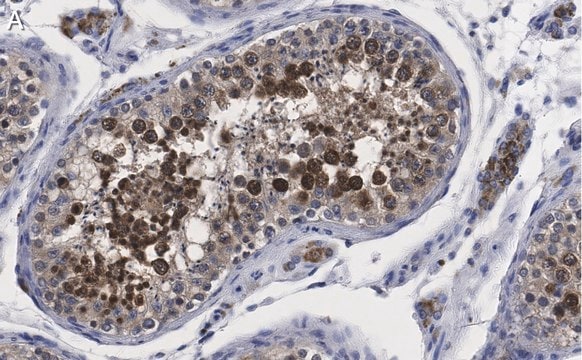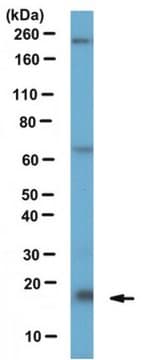C7736
Anti-Centrin antibody produced in rabbit
affinity isolated antibody, buffered aqueous solution
Sinónimos:
Anti-CEN1, Anti-CETN
About This Item
Productos recomendados
biological source
rabbit
Quality Level
conjugate
unconjugated
antibody form
affinity isolated antibody
antibody product type
primary antibodies
clone
polyclonal
form
buffered aqueous solution
mol wt
antigen 21 kDa
species reactivity
human
technique(s)
microarray: suitable
western blot: 1:2,000 using 293-T exp.Hu.Centrin-1LY117608 or 293-T exp.Hu.Centrin1-FLAG LY401316
UniProt accession no.
shipped in
dry ice
storage temp.
−20°C
target post-translational modification
unmodified
Gene Information
human ... CETN1(1068)
General description
Three separate centrin genes have been identified in human cells: centrin 1, 2, and 3. Centrin 1 shows strong amino acid homology to centrin 2 (85%), but lower homology to centrin 3 (54%) and CDC31 (50%) from the yeast S. cerevisiae. Centrin has a fundamental role in the MTOC structure and function. Phenotypic analysis of mutants in Chlamydomonas caltractin and the yeast CDC31 genes have indicated that the protein is required for proper duplication and segregation of the MTOC in the respective cells.
Immunogen
Application
- immunofluorescence
- immunoblotting
- immunofluorescence microscopy
Biochem/physiol Actions
Physical form
Disclaimer
¿No encuentra el producto adecuado?
Pruebe nuestro Herramienta de selección de productos.
Optional
Storage Class
10 - Combustible liquids
wgk_germany
WGK 2
flash_point_f
Not applicable
flash_point_c
Not applicable
Certificados de análisis (COA)
Busque Certificados de análisis (COA) introduciendo el número de lote del producto. Los números de lote se encuentran en la etiqueta del producto después de las palabras «Lot» o «Batch»
¿Ya tiene este producto?
Encuentre la documentación para los productos que ha comprado recientemente en la Biblioteca de documentos.
Nuestro equipo de científicos tiene experiencia en todas las áreas de investigación: Ciencias de la vida, Ciencia de los materiales, Síntesis química, Cromatografía, Analítica y muchas otras.
Póngase en contacto con el Servicio técnico








